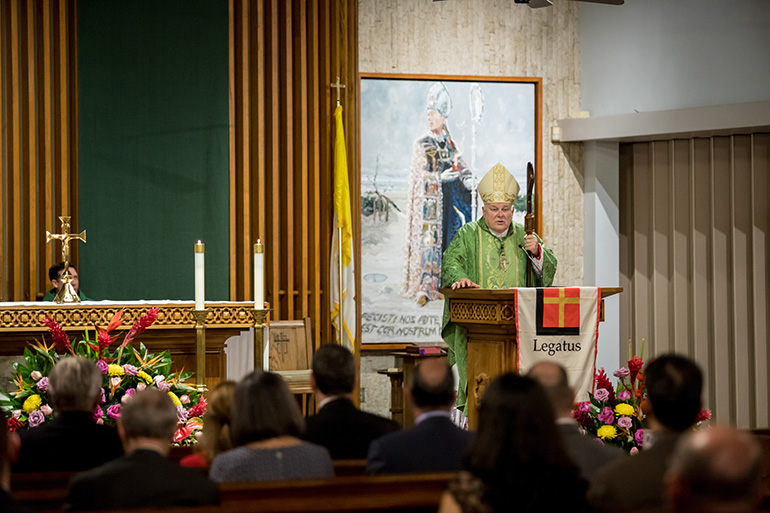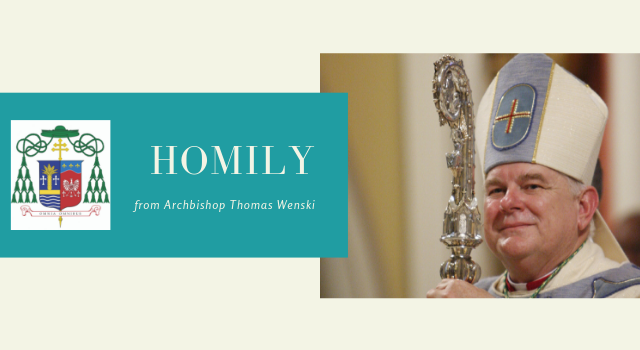By Archbishop Thomas Wenski - The Archdiocese of Miami

Photographer: TwoMatos Photography
Archbishop Thomas Wenski preaches the homily at the chartering Mass for the Miami Legatus chapter, Feb. 20, 2020, in St. Augustine Church, Coral Gables.
Archbishop Thomas Wenski preached this homily during a Mass he celebrated prior to the chartering ceremony for a Miami chapter of Legatus, a group for Catholic business leaders. The Mass was celebrated Feb. 20, 2020, at St. Augustine Church and Catholic Student Center in Coral Gables.
In this evening’s Gospel, Peter gives us the first creed in response to Jesus’ question: Who do you say that I am? “You are the Christ,” he replies. We are Christians – to the extent that we make Peter’s profession of faith our own. Of course, the Church would expand on this profession of faith – we have the Apostles’ Creed, the Nicene Creed, and in the confusions of the ‘70s, Pope St. Paul VI gave us the Credo of the People of God.
Peter was quick to acknowledge Jesus as the Christ – but he recoiled at the implications as Jesus went on to explain them, namely that he would be crucified. Thus, he earned Jesus’ rebuke: “Get behind me, Satan. You are thinking not as God does but as men do.” This week, the first readings at Mass are taken from St. James – he reminds us, as Jesus reminded Peter, you have to talk the talk but also you have to walk the walk. Orthodoxy (right teaching) is inseparable from Orthopraxy (right living).
As Catholics we believe that we have received the faith in baptism – but faith is both a gift and a task. We must work at developing it – both in our understanding of its “doxas” as well as its “praxis”. And, I daresay, this is what Legatus is about. Faith is to see the world– and I might add – to live in the world in a particular way – the way of Jesus Christ. And faith, as St. James makes abundantly clear in today’s first reading, is not about esoteric, other-worldly, navel gazing. “Religion,” he says in this same epistle, “is to care for orphans and widows and to keep oneself unstained by the world.” As Jesus said, we are to be in the world but not of the world.
But this does not mean that we, the followers of Christ, are somehow to be against the world. To the contrary, we are called to be “for the world.”
As members of Legatus, as professionals in the business community, and successful ones at that, you are certainly “in the world.” And your careers are ways in which you can be and are “for the world” without belonging to the world.
As Catholics, your success in business cannot be judged solely on the bottom line – your business performance will be judged on that to be sure; but also, it will be judged on how it has helped you to achieve personal sanctification and how it has helped others achieve this as well. In other words, you should see your business as a “vocation,” a way of responding to your baptismal call to holiness.
The separation of faith from life has always been a temptation from the earliest days of Christianity; but it has become a real problem today. The tenets of our faith seem to have nothing to do with what is taught in MBA curricula. The secularism that is increasingly dominant in our society affects the way we think and act – and the way we do business.
Secularism, as I sometimes tell the kids in the confirmations that I have been celebrating in these days, is a 50-cent word that means pretending to organize one’s life as if God did not matter. The late Cardinal George wrote in his last book, God in Action: How Faith in God Can Address the Challenges of the World, “as human autonomy has become the preeminent value, and progress is substituted for providence, God’s role has largely disappeared from popular consciousness.”
How often have we been tempted to dismiss an ethical concern, how often have we stifled the voice of conscience in making a difficult decision by just saying: business is business?
Understanding that as Christians we are “for the world” – and understanding our commitment to success in business as a vocation – can help us avoid the separation of faith from the ordinary affairs of life. In this way, our work can become more than just complying with the standards and protocols of a company. Our work – what we do and how we do it – also witnesses that “God does matter.”
In the Catholic tradition, work is not a curse. That would be the wrong way to interpret the book of Genesis. Work is a creative activity, and therefore an imitation of God’s own creative activity. For a believer, then, work is participating in God’s plan for the world. Made in the image and likeness of our Creator God, we acknowledge ourselves to be his creatures when we labor in line with his purpose and we establish goals to achieve what is good for ourselves and for others.
Too often, preachers often influenced less by Saint Mark as they are by Karl Marx, try to make businesspeople in the pew feel guilty for their success. There is nothing wrong in making a profit – in fact, when a firm makes a profit it shows that it has used its resources correctly and human needs have been satisfied.
Nevertheless, profit is not the sole criteria for judging a firm’s condition. It is possible for the accounts to be in order, and at the same time the people who make up the community of workers could be humiliated and offended.
Work brings people together for the service of society. God made us as social beings and work is done within a community of persons. The marketplace provides many opportunities to be creative and productive and to create wealth. This is good but there is also an order of importance: Business manuals advise that the best companies are the ones that respect and care for their employees.
We are social beings – it’s the way that God made us. If our work, and our careers, undermine rather than strengthen the network of relationships that make up our lives then something is wrong. In other words, if we allow ourselves to live – and to do business – as if God doesn’t matter, then our neighbors won’t matter, our employees and co-workers won’t matter, our families won’t matter, our marriages won’t matter.
Let me just conclude with another plug for Cardinal George’s book, which I relied heavily upon to put together these thoughts this evening, God in Action: How Faith in God Can Address the Challenges of the World.
In an age when people too often put themselves in the center of attention, the cardinal reminds us that as we go about our lives that most important human activity is to watch for God’s. May we have the clear-sighted faith that Peter had when he declared that Jesus was the Christ; and may we, like Peter did, allow God to point us to the way of being in the world and being for the world without being of the world or against the world – in other words, to think and act as God does.

